Today, I consider myself a recreational shooter, an occasional hunter and a former competitor.
As I run basic tests of many high-quality guns coming into the marketplace, my focus is usually the “fun” part of shooting. But there’s another thought that’s always there: could it be suitable for self/home defense?
Seems everyone’s constantly debating a simple question: if forced to switch from fun to fight, is this enough gun?
“Enough” isn’t a consideration when it comes to hunting. State wildlife management agencies have regulations covering what they consider “enough gun.” Otherwise, “enough gun” never suffers a shortage of opinions. There is no hard/fast rule.
Yes, in an emergency any gun beats no gun. True, but not helpful.
“Enough” isn’t the same for everyone.
For some, their minimum is a heavy-caliber, full-sized handgun loaded with +P+ ammo. Heavy to carry, hard to conceal and punishing to shoot - absent the adrenaline rush of an emergency.
Definitely not conducive to practice. In some instances, the selected choice for “enough” might actually be “too much.” Because practice is never optional. Shooting skills are perishable.
Absent the ability to quickly and accurately place those magnum rounds under stress, they might be better off swapping the hand-cannon for sneakers and running away.
A gunfighter’s gun doesn’t make you a gunfighter. But…a gunfighter’s skills make virtually every gun “enough.”
Like many of life’s choices, “enough” is a balancing act.
Cost is definitely a factor. And guns are bargains compared to ammunition. And you must practice. So wants/needs are balanced against hard economic realities.
Size, weight, caliber, concealability and capacity also play parts in our final decisions.
But the ability to control it, manipulate it, and put rounds on target with it -accurately- should be your primary concern. Otherwise, you’re betting lives - your own and others’ - on suddenly being able to accurately run a gun you either don’t like to shoot or can’t shoot/run well.

My perspective on “enough” has changed. Today, enough means “sufficient to allow me to withdraw from a situation” - unless there is simply no other option. In public places, that means a small handgun. Gun size, caliber and capacity increase the further I get from civilization.
For extended distances a long gun (secured) is added. I hope I won’t need either, but the Scouts did a great of job of imprinting “be prepared” on me.
At home, a daylight knock at the front door or a ring of the doorbell means a small handgun (discretely carried, then dropped in a pocket).
A “bump in the night” requires something larger: a pump shotgun. More than sufficient to discourage marauding critters - of any type, especially with a light/laser combination. Letting any “critter” know it is unwelcome might avoid escalation. Looking for sights might take longer than prudent if a threat presents itself.
My tools might change, but my goal never does: to avoid/discourage an encounter, not have a gunfight. Gunfights should never top anyone’s To-Do list.
If intruders run away, I win. Apprehending miscreants is a job for the police.
Would my mindset and equipment be the same if I suspected something bad really was coming?
Absolutely not.
That would require a combative mindset and appropriate equipment.
A long gun, with spare magazines/ammo would become primary. A large capacity handgun, again with spare magazines, would be secondary. A shotgun - nearby- would be for a last-stand scenario. Allowing someone into to shotgun distance would represent a tactical failure.
My single objective is to make certain mine are the last people standing - and being prepared to do whatever is required to make that happen.
Owning firearms requires a responsible mindset. For me, carrying a gun for self defense requires carefully considering appropriate responses before I’m forced to improvise.
FYI, this isn’t a new attitude.
Preparation - for any task - was drummed into my impressionable young noggin during my time in Buffalo Patrol/Troop 251, Boy Scouts of America, Gravel Switch, Kentucky.
Traveling the world during the half-century since has only reinforced the wisdom of the advice.
Being prepared is never a bad thing. Being unprepared always is.
— Jim Shepherd
